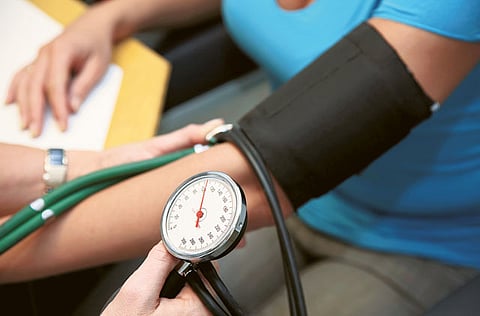Handling lifestyle diseases
People with ailments can fast if they can control their sickness effectively with minimal medication and healthy living

It seems that Ramadan is flying by. It feels like we began preparing for its arrival just yesterday and now it's more than half gone. Interestingly, a similar condition exists at our clinic where half the patients who should be keeping their appointments are also gone. Therefore, we expect a deluge right after Ramadan.
There have been requests to discuss how to handle common ailments such as high blood pressure, high cholesterol, heart problems, asthma and diabetes during Ramadan.
Hypertension or high blood pressure is very common. In most cases, patients have what is called essential hypertension. It is a nice way of saying we don't know what the underlying cause is. In terms of effective control of this condition, the salt intake has to be controlled and proper medications have to be prescribed.
There are multiple categories of medications that are used to treat high blood pressure. Since they act in a different manner from each other, frequently they are used in combination. So it is certainly not uncommon for patients to be on multiple medications in order to effectively control their blood pressure.
With regard to Ramadan, one such category is diuretics or ‘water pills'. These medications effectively increase the urinary output, causing the blood volume to decrease and that in turn decreases the blood pressure. Given the hot weather and the duration of the fast, the dosage of this medication may need to be adjusted.
By and large, there is no major change that is required in terms of the usual anti-hypertensive medications as long as the blood pressure is well controlled. However, the physician must be consulted prior to Ramadan before making any changes to the medication profile as that can be detrimental to health.
High risk
Conversely, low blood pressure or hypotension is a much more serious affair. People suffering from low blood pressure may have significant underlying glandular problems. It is strongly recommended that they should not fast until they are cleared by their physicians.
In terms of elevated cholesterol levels, the two key points to remember during Ramadan are to stay away from fried foods and keep the intake of dairy products limited to the low fat brands. The usual medication that one is taking for this condition needs to be continued.
Asthma is another common condition. Earlier this month, the print media carried a report stating that "asthmatics that use an inhaler will be ending their fast, according to a Ramadan series of fatwas issued by the Dubai Islamic Affairs and Charitable Activities Department". However, if someone has been asthma-free for quite some time and is off inhalers, they can most likely fast with the approval of their doctors.
Please do bear in mind that the current weather conditions may trigger asthma in some individuals and the necessary care needs to be exercised.
Heart problems or cardiac diseases can mean anything from electrical or mechanical issues pertaining to the heart as well as obstruction of the blood flow to the heart muscles.
The electrical issues have to do with the rhythm of the heart such as a fast, slow or irregular heart beat whereas mechanical issues relate to the pumping action of the heart.
The blood supply to the heart may get blocked, leading to a heart attack. With modern interventional techniques, this blockage is quite effectively treated by either opening up the blockage with a balloon and stents or performing bypass surgery. Subsequent to that, a fairly normal lifestyle can be resumed.
Similarly, effective techniques are available to treat the electrical problems. However, a significant number of cardiac patients must be on medication in order to control any of the different ailments mentioned above. Therefore, the clinical judgement of a cardiologist would effectively determine the ability of a person to fast.
Moving on to diabetes, most of our patients at the Dubai Diabetes Centre have their treatment regime stabilised for Ramadan by now. However, weekends still seem to create problems when the routine gets disturbed. These are the realities of life and we have to deal with them.
In the end, we have to realise that chronic diseases, such as those mentioned above are the ones we live with on a daily basis. The level of control of these ailments differs widely. It stands to reason that if a certain disease is controlled effectively with minimal amount of medication and lifestyle modification, that person in all likelihood, can proceed with fasting.
However, in cases where the disease is unstable or recently diagnosed, it stands to reason that one should not proceed with fasting. After all, the God Almighty has, in his infinite wisdom, allowed us not to fast in certain conditions, including sickness.
Dr M. Hamed Farooqi is the Director of the Dubai Diabetes Centre at the Dubai Health Authority. He is US Board Certified in Internal Medicine as well as Endocrinology and is a Fellow of both the American College of Physicians and Endocrinologists. (This article is the fourth in a five-part weekly series.)


